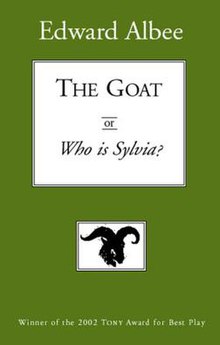
Edward Franklin Albee III was an American playwright known for works such as The Zoo Story (1958), The Sandbox (1959), Who's Afraid of Virginia Woolf? (1962), A Delicate Balance (1966), and Three Tall Women (1994). Some critics have argued that some of his work constitutes an American variant of what Martin Esslin identified and named the Theater of the Absurd. Three of his plays won the Pulitzer Prize for Drama and two of his other works won the Tony Award for Best Play.

Who's Afraid of Virginia Woolf? is a play by Edward Albee first staged in October 1962. It examines the complexities of the marriage of middle-aged couple Martha and George. Late one evening, after a university faculty party, they receive unwitting younger couple Nick and Honey as guests, and draw them into their bitter and frustrated relationship.

Terrence McNally was an American playwright, librettist, and screenwriter. Described as "the bard of American theater" and "one of the greatest contemporary playwrights the theater world has yet produced," McNally was the recipient of five Tony Awards. He won the Tony Award for Best Play for Love! Valour! Compassion! and Master Class and the Tony Award for Best Book of a Musical for Kiss of the Spider Woman and Ragtime, and received the 2019 Tony Award for Lifetime Achievement. He was inducted into the American Theater Hall of Fame in 1996, and he also received the Dramatists Guild Lifetime Achievement Award in 2011 and the Lucille Lortel Lifetime Achievement Award. In 2018, he was inducted into the American Academy of Arts and Letters, the highest recognition of artistic merit in the United States. His other accolades included an Emmy Award, two Guggenheim Fellowships, a Rockefeller Grant, four Drama Desk Awards, two Lucille Lortel Awards, two Obie Awards, and three Hull-Warriner Awards.

Torch Song Trilogy is a collection of three plays by Harvey Fierstein rendered in three acts: International Stud, Fugue in a Nursery, and Widows and Children First! The story centers on Arnold Beckoff, a Jewish homosexual, drag queen, and torch singer who lives in New York City in the late 1970s and early 1980s. The four-hour play begins with a soliloquy in which he explains his cynical disillusionment with love.

Mercedes J. Ruehl is an American screen, stage, and television actress. She is the recipient of several accolades, including an Academy Award, a Golden Globe Award, a Tony Award, a Drama Desk Award, two Obie Awards, and two Outer Critics Circle Awards.

William Mills Irwin is an American actor, choreographer, clown, and comedian. He began as a vaudeville-style stage performer and has been noted for his contribution to the renaissance of American circus during the 1970s. He has made a number of appearances on film and television, and he won a Tony Award for his role in Who's Afraid of Virginia Woolf?. He also worked as a choreographer on Broadway and was nominated for the Tony Award for Best Choreography in 1989 for Largely New York. He is also known as Mr. Noodle on the Sesame Street segment Elmo's World, and he appeared in the Sesame Street film short Does Air Move Things?. He has regularly appeared as Dr. Peter Lindstrom on Law & Order: Special Victims Unit, and had a recurring role as "The Dick & Jane Killer" on CSI: Crime Scene Investigation. From 2017 to 2019, he appeared as Cary Loudermilk on the FX television series Legion.
Will Eno is an American playwright based in Brooklyn, New York. His play, Thom Pain was a finalist for the Pulitzer Prize in Drama in 2005. His play The Realistic Joneses appeared on Broadway in 2014, where it received a Drama Desk Special Award and was named Best Play on Broadway by USA Today, and best American play of 2014 by The Guardian. His play The Open House was presented Off-Broadway at the Signature Theatre in 2014 and won the Obie Award for Playwriting as well as other awards, and was on both TIME Magazine and Time Out New York 's Top Ten Plays of 2014.

Jeanine Tesori, known earlier in her career as Jeanine Levenson, is an American composer and musical arranger best known for her work in the theater. She is the most prolific and honored female theatrical composer in history, with five Broadway musicals and six Tony Award nominations. She won the 1999 Drama Desk Award for Outstanding Music in a Play for Nicholas Hytner's production of Twelfth Night at Lincoln Center, the 2004 Drama Desk Award for Outstanding Music for Caroline, or Change, the 2015 Tony Award for Best Original Score for Fun Home, making them the first female writing team to win that award, and the 2023 Tony Award for Best Original Score for Kimberly Akimbo. She was named a Pulitzer Prize for Drama finalist twice for Fun Home and Soft Power.

Lost in Yonkers is a play by Neil Simon. The play won the 1991 Pulitzer Prize for Drama.
Three Tall Women is a two-act play by Edward Albee that premiered at Vienna's English Theatre in 1991. The three unnamed women, one in her 90s, one in her 50s, and one in her 20s, are referred to in the script as A, B, and C. The character of A, the oldest woman, is based in part on Albee's mother. In the first act, B is the caretaker and C is the lawyer for A, while in the second act they become personifications of A from earlier in her life.

Frances Hussey Sternhagen was an American actress. Sternhagen was known as a character actress who appeared on- and off-Broadway, in movies, and on television for over six decades. She received numerous accolades including two Tony Awards, a Drama Desk Award and a Saturn Award, as well as nominations for three Primetime Emmy Awards.

Michael Cristofer is an American actor, playwright and filmmaker. He received the Pulitzer Prize for Drama and the Tony Award for Best Play for The Shadow Box in 1977. From 2015 to 2019, he played the role of Phillip Price in the television series Mr. Robot.

Irene Worth, CBE, born Harriett Elizabeth Abrams, was an American stage and screen actress who became one of the leading stars of the British and American theatre. She pronounced her given name with three syllables: "I-REE-nee".
David Esbjornson is a director and producer who has worked throughout the United States in regional theatres and on Broadway, and has established strong and productive relationships with some of the profession's top playwrights, actors, and companies. Esbjornson was the artistic director of Seattle Repertory Theatre in Seattle, Washington, but left that position in summer 2008.

Emily Betsy Mann is an American director, playwright and screenwriter. She served as the artistic director and resident playwright of the McCarter Theatre Center from 1990 to 2020.

The Play About the Baby is a play by Edward Albee.
They Knew What They Wanted is a 1924 play written by Sidney Howard. The play premiered on Broadway in 1924 and had three Broadway revivals as well as a London production.

William Pullman is an American actor. After graduating with a Master of Fine Arts degree in theater, he was an adjunct professor at Montana State University before deciding to pursue acting. He made his film debut in Ruthless People (1986), and starred in Spaceballs (1987), The Accidental Tourist (1988), Sleepless in Seattle (1993), While You Were Sleeping (1995), Casper (1995), Independence Day (1996), Lost Highway (1997), and Lake Placid (1999). He has appeared frequently on television, usually in TV films. Starting in the 2000s he has also acted in miniseries and regular series, such as Torchwood (2011), starring roles in 1600 Penn (2012–13) and The Sinner (2017–2021). In 2021, he had a recurring role in the miniseries Halston.
Pam MacKinnon is an American theatre director. She has directed for the stage Off-Broadway, on Broadway and in regional theatre. She won the Obie Award for Directing and received a Tony Award nomination, Best Director, for her work on Clybourne Park. In 2013 she received the Tony Award for Best Direction of a Play for a revival of Who's Afraid of Virginia Woolf? She was named artistic director of American Conservatory Theater in San Francisco, California on January 23, 2018.

Daryl Roth is an American theatre producer who has produced over 90 productions on and off Broadway. Most often serving as a co-producer or investor, Roth has also been a lead producer of Broadway shows such as Kinky Boots, Indecent, Sylvia, It Shoulda Been You, and The Normal Heart.















